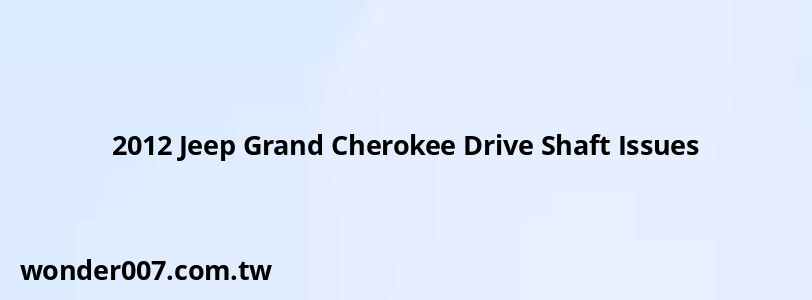2012 Jeep Grand Cherokee Drive Shaft Issues

The 2012 Jeep Grand Cherokee is known for experiencing drive shaft problems, which can significantly impact vehicle performance and safety. Owners of this model year should be aware of potential issues and their symptoms to address them promptly.
Common Drive Shaft Problems
Drive shaft issues in the 2012 Jeep Grand Cherokee often manifest as:
- Intense vibrations from underneath the vehicle
- Loud clunking or squeaking noises, especially during acceleration
- Difficulty turning or shuddering when accelerating
- Unusual movement in the drive shaft
These symptoms typically indicate wear or failure of components such as U-joints, CV joints, or the center support bearing.
Causes of Drive Shaft Failure
Several factors contribute to drive shaft problems in the 2012 Grand Cherokee:
- Normal wear and tear: Over time, components naturally degrade
- Lack of maintenance: Neglecting regular inspections and lubrication
- Environmental factors: Exposure to harsh conditions like water, salt, or debris
- Manufacturing defects: Some units may have inherent flaws from production
Diagnosing Drive Shaft Issues
To identify drive shaft problems:
1. Listen for unusual noises during acceleration or turning
2. Feel for vibrations, especially at higher speeds
3. Visually inspect the drive shaft for signs of damage or misalignment
4. Check for loose bolts or worn rubber components
If you suspect a problem, it's crucial to have a professional mechanic inspect the vehicle promptly.
Repair Options
Depending on the severity of the issue, repair options may include:
- Replacing worn U-joints or CV joints
- Installing a new center support bearing
- Balancing the drive shaft
- In severe cases, replacing the entire drive shaft assembly
Costs can vary significantly, with minor repairs starting around $200 and full replacements potentially exceeding $1000.
Preventive Maintenance
To avoid drive shaft issues:
- Schedule regular inspections, especially before long trips
- Keep the drive shaft components properly lubricated
- Address any unusual noises or vibrations immediately
- Consider upgrading to more durable aftermarket components if problems persist
Impact on Vehicle Performance
A faulty drive shaft can lead to:
- Reduced power transmission to the wheels
- Increased fuel consumption
- Potential damage to other drivetrain components
- In extreme cases, complete loss of vehicle control
Addressing drive shaft problems promptly is essential for both safety and performance.
FAQs About 2012 Jeep Grand Cherokee Drive Shaft Problems
- Can I drive with a bad drive shaft?
It's not recommended. Driving with a faulty drive shaft can lead to further damage and safety risks. - How often should I have my drive shaft inspected?
Generally, every 30,000 miles or during regular maintenance checks. - Are aftermarket drive shafts better than OEM?
Some aftermarket options offer improved durability, but quality varies. Research reputable brands before upgrading.
By understanding these common issues and taking proactive measures, owners can help ensure their 2012 Jeep Grand Cherokee remains reliable and safe on the road.
Related Posts
-
2012 Chevy Traverse Low Side AC Port Location
30-01-2025 • 206 views -
2012 Hyundai Elantra Wheel Bearing Replacement
31-01-2025 • 170 views -
Buick LeSabre: Troubleshooting Drive Issues
29-01-2025 • 198 views -
Jeep Liberty Transmission Fluid Capacity: Essential Guide
28-01-2025 • 263 views -
2007 Hyundai Santa Fe Camshaft Position Sensor Location
31-01-2025 • 168 views
Latest Posts
-
Are O2 Sensors Covered Under Warranty
01-02-2025 • 448 views -
2015 Chevy Traverse AC Recharge Port Location
01-02-2025 • 488 views -
Power Steering Fluid Leak On Passenger Side
01-02-2025 • 534 views -
Rear Brake Caliper Piston Won't Compress
01-02-2025 • 425 views -
How To Turn Off Paddle Shifters Mercedes
01-02-2025 • 461 views
Popular Posts
-
Toyota Hiace: Fuel Efficiency Insights for 2025
26-01-2025 • 801 views -
Hino Warning Lights: Understanding Dashboard Alerts
26-01-2025 • 954 views -
V12 Engine Costs: What You Need to Know
26-01-2025 • 775 views -
BMW X5: Fuel Tank Capacity and Specifications
28-01-2025 • 723 views -
EPC Light: Understanding Causes and Solutions
26-01-2025 • 1153 views
